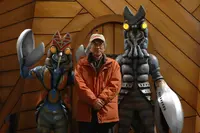Toshihiro Iijima is a Japanese producer and film director. His pen name is Kitao Senzoku .[1]
Biography
After graduating from Tokyo Metropolitan Koishikawa High School, Iijima entered Keio University in 1952 because of his interest in playwrights. While at school, he joined a broadcasting company to write scripts for radio plays. After graduating from Tokyo Radio Station, he worked part-time and was hired as an employee of KRT (now TBS Television) in 1957. In the same year, he directed the TV series Masurawo hashutsufu kai and other works for the first time.
In 1963, Iijima was transferred to the newly established TBS Film Production Department to participate in the shooting of TV dramas and movies. Later, at Hajime Tsuburaya's request, he was seconded to Tsuburaya Special Effects Productions headed by Eiji Tsuburaya as the director of the film department. Directed and wrote the screenplay for Ultra Q before he served as director of such Ultra series as Ultraman (1966), Ultraseven (1967) and Operation: Mystery (1968) .
In the 2000s, he participated in the production of some works in the Heisei Ultraman series.
Alien Baltan
Iijima, known as the "creator of Alien Baltan,"[2][3] directed several episodes centered around Alien Baltan in the series. As a TBS employee at the time, Iijima wrote the scripts under the pen name "Kitao Senzoku" and personally directed the episodes. In reality, the concept of Alien Baltan was proposed by Iijima, while the alien's design was completed by Tohl Narita. In an interview featured in "Max! Max! Max! Monster Great Picture Book," Iijima described Alien Baltan as a "negative teacher," reflecting the potential future of humanity with advancements in science and economics beyond what we have today.[4][5]

In a 2016 interview, Iijima stated that the first appearance of Alien Baltan was the true depiction of the character. He did not acknowledge the various iterations of Alien Baltan that appeared in other Ultraman series beyond the episodes he directed. Over the course of more than 40 years, the changes in the depiction of Alien Baltan were a result of Iijima's contemplation on the concept of "justice." This process reflected Iijima's thoughts, reflections, and dedication to the topic in his works. He personally believed that the storyline depicted in episodes 33 and 34 of Ultraman Max, titled "Welcome! To the Earth," was the ultimate culmination of Alien Baltan-themed episodes.[6]
Iijima also mentioned his motivation when filming the Ultraman series. Initially, he was transferred from the adult drama team to the Ultraman production team. At that time, some people around him expressed sympathy. "Although it's made for children, we don't intend to create a show that merely amuses them." Therefore, his production team sounded the alarm against the supremacy of science and economics, teaching the children of that era that humanity is, in fact, a small and humble existence.[7]
Regarding the recent direction of the series, Iijima believes that "Ultraman is a messenger of peace from the Land of Light who has come to Earth and should never be a warrior." This has been his unwavering belief. "Lately, I sometimes feel that the dialogue has become a bit difficult to understand. As a writer for the general audience, I fundamentally want to make my works easy for children to understand and maintain a gentle tone. The focus of my depiction is not on battles but rather on ensuring that children always hold onto hope. Even though the advancement of civilization may lead to a challenging world, I hope to present a future that should never be abandoned."[8][9]
Death
October 17, 2021. Iijima died of aspiration pneumonia at the age of 89.[10][11]
Works
- Ultra Q (1966) - Director and writer, 6 episodes
- Episode 1 "Defeat Gomess!" (writer)
- Episode 7 "S.O.S. Mount Fuji" (director and writer)
- Episode 10 "The Underground Super Express Goes West" (director and writer)
- Episode 18 "The Rainbow's Egg"
- Episode 19 "Challenge from the Year 2020" (director and writer)
- Episode 26 "Blazing Glory" (writer)
- Ultraman (1966-1967) - Director and writer, 7 episodes
- Episode 2 "Shoot the Invaders!" (director and writer)
- Episode 3 "Science Patrol, Move Out"
- Episode 5 "Secret of the Miloganda"
- Episode 16 "Science Patrol Into Space" (director and writer)
- Episode 17 "Passport to Infinity"
- Episode 24 "The Undersea Science Center"
- Episode 25 "Mystery Comet Tsuifon"
- Ultraseven (1968) - Director, 3 episodes
- Episode 38 "The Courageous Battle"
- Episode 39 "The Seven Assassination Plan Part 1"
- Episode 40 "The Seven Assassination Plan Part 2"
- Operation: Mystery (1968) - Director, 5 episodes
- Episode 1 "Man Through the Wall"
- Episode 3 "White Face"
- Episode 12 "Fairy Tale of Fog"
- Episode 14 "Good Night"
- Episode 26 "The Snow Woman"
- Return of Ultraman (1971) - Writer, 1 episode
- Episode 32 "Decisive Battle Under the Setting Sun"
- Daigoro vs. Goliath (1972) - Director
- Ultraman Cosmos: The First Contact (2001) - Director and writer
- Ultraman Max (2006) - Director and writer, 2 episodes
- Episode 33 "Welcome! To the Earth: Part 1: The Science of the Planet Baltan" (director and writer)
- Episode 34 "Welcome! To the Earth: Part 2: Farewell! Alien Baltan" (director and writer)
Literature
- Ultraman: Operation Giant (2005) - Writer
References
- ↑ https://www.worldcat.org/zh-tw/title/170019439
- ↑ https://hochi.news/articles/20211018-OHT1T51130.html?page=1
- ↑ https://www.asahi.com/articles/ASPBL6595PBLUCLV010.html
- ↑ https://mainichi.jp/articles/20170908/mog/00m/040/012000c
- ↑ https://mainichi.jp/articles/20200116/dde/012/040/021000c
- ↑ https://ayamekareihikagami.hateblo.jp/entry/2016/05/30/214523
- ↑ https://book.asahi.com/article/11583134
- ↑ https://ayamekareihikagami.hateblo.jp/entry/2021/10/21/224643
- ↑ https://news.mynavi.jp/article/20211019-2163786/
- ↑ https://www.sanspo.com/article/20211018-T73HZBPY2FAZBP3WPBZPQZCJMM/
- ↑ https://m-78.jp/news/post-6103
